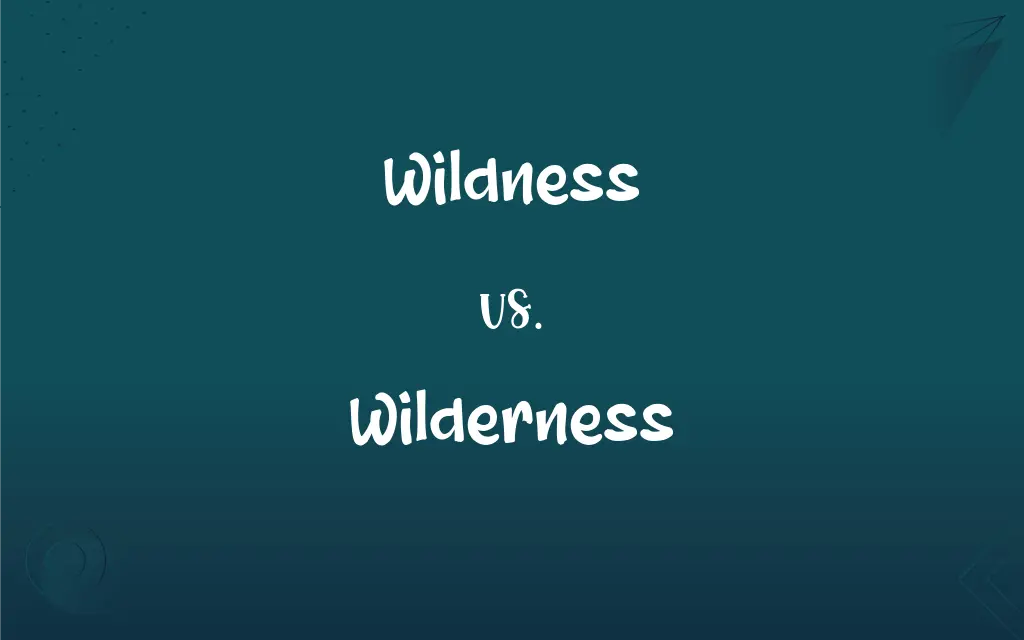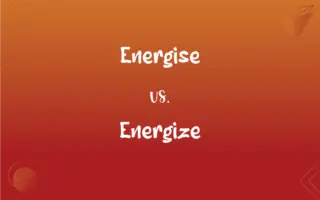Wildness vs. Wilderness: What's the Difference?
By Janet White || Updated on March 3, 2024
Wildness refers to the untamed nature of beings or environments, emphasizing a lack of human influence, while wilderness describes vast, undeveloped areas often protected for their natural value.

Key Differences
Wildness captures the essence of being untamed, uncontrolled, and often unpredictable, typically associated with animals, natural forces, or human emotions. On the other hand, wilderness specifically refers to large expanses of natural land that remain largely untouched by human development, often protected for ecological, cultural, or recreational purposes.
In literature and philosophy, wildness is often used metaphorically to describe the innate, raw aspects of nature or human character, suggesting a primal state untouched by civilization. Wilderness, however, is more concrete, denoting physical spaces that embody this concept of wildness, serving as havens for biodiversity and natural processes.
The conservation movement frequently highlights the importance of preserving wilderness areas for their ecological value, climate regulation, and as habitats for wildlife. In contrast, the concept of wildness is invoked to foster a deeper appreciation and understanding of the natural world's intrinsic wild characteristics, including its unpredictability and autonomy from human control.
In human psychology and cultural narratives, wildness is sometimes viewed as a quality to be tamed or harnessed, associated with freedom and creativity, but also chaos and danger. Wilderness areas, by extension, are often romanticized as places where one can reconnect with this wild aspect of nature and, by extension, a more authentic self.
The legal and policy frameworks around the world establish specific criteria and protections for wilderness areas, recognizing their critical role in conservation and ecological balance. There is no such legal definition for wildness, as it is more of a philosophical or descriptive term rather than a categorizable entity.
ADVERTISEMENT
Comparison Chart
Definition
The quality of being untamed and natural
A large, undeveloped area remaining in a natural condition
Emphasis
Innate, uncontrolled nature of beings or environments
Vast, natural landscapes with minimal human impact
Usage
Metaphorical and descriptive in various contexts
Concrete, often in ecological and conservation contexts
Associated with
Animals, natural forces, human emotions
Specific large areas of land like forests, mountains
Cultural Perception
Often associated with freedom, creativity, and sometimes chaos
Romanticized as places of beauty, adventure, and self-discovery
ADVERTISEMENT
Legal Recognition
No specific legal status
Often protected by laws and designated as conservation areas
Wildness and Wilderness Definitions
Wildness
The innate, untamed nature of an entity.
The wildness of the storm was awe-inspiring.
Wilderness
A habitat for diverse wildlife and natural processes.
The wilderness area is home to many species not found elsewhere.
Wildness
A metaphor for unbridled emotions or behavior.
There was a wildness in her laughter that was infectious.
Wilderness
A symbol of natural beauty and purity in literature and art.
Artists often depict wilderness to evoke a sense of peace and wonder.
Wildness
Occurring, growing, or living in a natural state; not domesticated, cultivated, or tamed
Wild geese.
Edible wild plants.
Wilderness
A large area of natural land protected for its ecological value.
The national park was designated as wilderness to preserve its pristine condition.
Wildness
Not inhabited or farmed
Remote, wild country.
Wilderness
Legally designated areas intended for conservation and recreation.
The new legislation expanded wilderness protection to additional forests.
Wildness
Uncivilized or barbarous.
Wilderness
A large tract of land that has not been significantly affected by human activities.
Wildness
Lacking supervision or restraint
Wild children living in the street.
Wilderness
A tract of land officially protected from development and other high-impact human activities.
Wildness
Disorderly; unruly
A wild scene in the school cafeteria.
Wilderness
A barren or desolate area; a wasteland.
Wildness
Characterized by a lack of moral restraint; dissolute or licentious
Recalled his wild youth with remorse.
Wilderness
Something characterized by bewildering vastness, perilousness, or unchecked profusion
A wilderness of unknown city streets.
A wilderness of voices.
Wildness
Lacking regular order or arrangement; disarranged
Wild locks of long hair.
Wilderness
A state of neglect, powerlessness, or disfavor
"The failure of the Clinton health plan in 1994 opened the door to the Republicans' capture of Congress after forty years in the wilderness" (Jacob S. Hacker).
Wildness
Full of, marked by, or suggestive of strong, uncontrolled emotion
Wild with jealousy.
A wild look in his eye.
A wild rage.
Wilderness
(uncountable) Uncultivated and unsettled land in its natural state inhabited by wild animals and with vegetation growing wild; (countable) a tract of such land; a waste or wild.
Wildness
Extravagant; fantastic
A wild idea.
Wilderness
(by extension)
Wildness
Furiously disturbed or turbulent; stormy
Wild weather.
Wilderness
(countable) A place other than land (for example, the air or sea) that is uncared for, and therefore devoted to disorder or wildness.
Wildness
Risky; imprudent
Wild financial schemes.
Wilderness
An ornamental part of a garden or park cultivated with trees and often a maze to evoke a natural wilderness.
Wildness
Impatiently eager
Wild to get away for the weekend.
Wilderness
Unrefinedness; wildness.
Wildness
(Informal) Highly enthusiastic
Just wild about the new music.
Wilderness
Chiefly followed by of: a bewildering flock or throng; a large, often jumbled, collection of things.
Wildness
Based on little or no evidence or probability; unfounded
Wild accusations.
A wild guess.
Wilderness
A place or situation that is bewildering and in which one may get lost.
Wildness
Deviating greatly from an intended course; erratic
A wild bullet.
Wilderness
Often preceded by in the: a situation of disfavour or lack of recognition; of a politician, political party, etc.: a situation of being out of office.
Wildness
(Games) Having an equivalence or value determined by the cardholder's choice
Playing poker with deuces wild.
Wilderness
A tract of land, or a region, uncultivated and uninhabited by human beings, whether a forest or a wide, barren plain; a wild; a waste; a desert; a pathless waste of any kind.
The wat'ry wilderness yields no supply.
Wildness
In a wild manner
Growing wild.
Roaming wild.
Wilderness
A disorderly or neglected place.
Wildness
A natural or undomesticated state
Returned the zoo animals to the wild.
Plants that grow abundantly in the wild.
Wilderness
Quality or state of being wild; wildness.
These paths and bowers doubt not but our joint hands.Will keep from wilderness with ease.
Wildness
Often wilds A region that is mostly uninhabited or uncultivated
The wilds of the northern steppes.
Wilderness
A wild and uninhabited area
Wildness
To go about in a group threatening, robbing, or attacking others.
Wilderness
An undeveloped, wild region offering solitude and adventure.
They ventured into the wilderness for a true escape from civilization.
Wildness
The quality of being wild or untamed
Wildness
The quality or state of being wild; an uncultivated or untamed state; disposition to rove or go unrestrained; rudeness; savageness; irregularity; distraction.
Wildness
A feeling of extreme emotional intensity;
The wildness of his anger
Wildness
The property of being wild or turbulent;
The storm's violence
Wildness
A state of nature
Wildness
A characteristic of being free from human control.
The wolf's eyes gleamed with untamed wildness.
Wildness
The unpredictability and natural disposition of the natural world.
The wildness in his music captured the untamable spirit of nature.
Wildness
The essence of being untouched by civilization.
He admired the wildness of the remote landscape.
FAQs
How does wildness influence human culture and creativity?
Wildness often inspires human culture and creativity by symbolizing freedom, raw beauty, and the primal aspects of nature and human emotion.
Are all natural areas considered wilderness?
Not all natural areas are considered wilderness; only those that are vast, minimally impacted by human development, and often legally designated for protection meet the criteria.
What role does wilderness play in ecological balance?
Wilderness areas play a critical role in ecological balance by preserving diverse ecosystems, serving as carbon sinks, and maintaining natural processes.
What legal measures are used to protect wilderness areas?
Legal measures to protect wilderness areas include designating them as protected lands, restricting development and resource extraction, and implementing conservation management practices.
What distinguishes wildness from wilderness?
Wildness describes an innate, untamed quality, while wilderness refers to large, specific areas of natural land that embody this wildness.
Can wildness be found outside of wilderness areas?
Yes, wildness can be found in any natural setting or being that exhibits untamed, uncontrolled characteristics, not just in wilderness areas.
Can urban areas have elements of wildness?
Yes, urban areas can have elements of wildness, such as untamed green spaces, wildlife, and natural phenomena that exhibit uncontrolled natural characteristics.
How do perceptions of wildness and wilderness vary across cultures?
Perceptions of wildness and wilderness can vary widely, with some cultures venerating them as sacred or essential to identity, while others may view them as barriers to progress or sources of danger.
How does the concept of wildness relate to environmental ethics?
The concept of wildness relates to environmental ethics by emphasizing the intrinsic value of nature's untamed aspects and the importance of preserving natural environments from human domination.
Why is wilderness protection important?
Wilderness protection is crucial for preserving biodiversity, natural habitats, and ecological processes, as well as providing spaces for recreation and spiritual renewal.
Can wilderness areas be restored, or are they permanently designated?
Wilderness areas can sometimes be restored through conservation efforts if they have been degraded, but their designation as wilderness typically requires legal protection and a commitment to maintaining their natural state.
How do climate change and human activity threaten wilderness areas?
Climate change and human activities such as deforestation, mining, and pollution threaten wilderness areas by altering habitats, reducing biodiversity, and undermining the ecological functions these areas support.
What psychological benefits do wildness and wilderness offer humans?
Wildness and wilderness offer psychological benefits such as stress reduction, increased well-being, and a sense of connection to the natural world, fostering a sense of awe and spiritual renewal.
What are some common misconceptions about wilderness?
Common misconceptions about wilderness include the notion that these areas are completely untouched by humans and that they are always vast, uninhabited forests, ignoring the diversity of wilderness areas and the historical presence of indigenous peoples.
Is wildness always associated with nature, or can it apply to human-made environments?
While wildness is primarily associated with natural environments and beings, it can also describe aspects of human-made environments or situations that exhibit chaos, unpredictability, or lack of control.
How does the concept of wildness differ in urban vs. rural contexts?
In urban contexts, wildness might be found in spontaneous vegetation, urban wildlife, or chaotic urban landscapes, whereas in rural contexts, it's more often associated with natural landscapes and traditional forms of living closer to nature.
How do wildness and wilderness influence art and literature?
Wildness and wilderness have deeply influenced art and literature by serving as symbols of freedom, mystery, and the sublime, inspiring countless works that explore the human-nature relationship.
How do wildness and wilderness contribute to biodiversity?
Wildness, as an attribute of living organisms and natural processes, contributes to the complexity and resilience of ecosystems, while wilderness areas provide protected habitats that support a wide range of biodiversity.
What is the role of education in fostering appreciation for wildness and wilderness?
Education plays a crucial role in fostering appreciation for wildness and wilderness by teaching about ecological processes, the value of natural habitats, and the importance of conservation efforts to preserve these vital aspects of our planet.
Are there any international agreements to protect wilderness areas globally?
Yes, there are international agreements such as the Convention on Biological Diversity and the World Heritage Convention that contribute to the protection of wilderness areas on a global scale.
About Author
Written by
Janet WhiteJanet White has been an esteemed writer and blogger for Difference Wiki. Holding a Master's degree in Science and Medical Journalism from the prestigious Boston University, she has consistently demonstrated her expertise and passion for her field. When she's not immersed in her work, Janet relishes her time exercising, delving into a good book, and cherishing moments with friends and family.































































